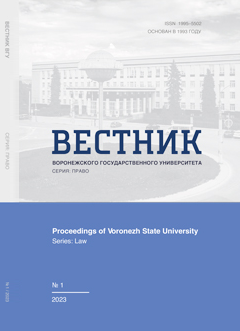Об аргументативной сущности приговора суда
Аннотация
Рассматривается сущность приговора как юридического документа, логико-композиционные и содержательные особенности которого строго регламентированы законом. В то же время приговор, вынесенный в обычном порядке, содержит аналитическую составляющую в виде обоснования выводов суда, что позволяет считать его аргументативным текстом. Затрагивается вопрос о том, какое место занимает юридическое рассуждение в структуре приговора. Утверждается, что аргументация в тексте приговора является главным средством смыслообразования.
Скачивания
Литература
Alexandrov A. S. Purpose and means of argumentation in criminal proceedings / Legal technology. Yearbook. N. Novgorod. 2013. № 7, part 1. P. 52–59.
Bortnikov V. I., Mikhailova Yu. N. Documentary linguistics: study guide. Allowance. Yekaterinburg : Ural University Publishing House, 2017. 132 p.
Vasilenko L. Yu. Linguo-cognitive analysis of argumentation in the text of the judgment: author. dis. ... Cand. philol. Sciences. M., 2011. 18 p.
Vasilenko S. K. The use of automated technologies in the production of court procedural documents // Russian judge. 2006. № 9. P. 15–18.
Danilevskaya N. V. Argumentative actions in the framework of cognitive // Stereotype and creativity in the text: interuniversity. Sat. scientific. works / otv. ed. M. P. Kotyurov. Perm, 2004. Р. 137–161.
Zaitsev D. V., Belikov A. A. Modeling argumentation: assessments and reasoning // Proceedings of the Tomsk State University. U niversity Philosophy. Sociology. Political science. 2020. № 57. P. 13–24.
Zayakin A., Smagin A. The judges are holding us by the blank. URL: https://www.novayagazeta.ru/articles/2019/03/20/79929-sudi-derzhat-nas-za-bolvanku
Karasik V. I. On the types of discourse // Language personality: institutional and personal discourse: collection of scientific papers. Volgograd, 2000. P. 7–12.
Karasik V. I. Language circle: personality, concepts, discourse. Volgograd, 2002. 477 р.
Kupina N. A., Matveeva T. V. Stylistics of the modern Russian language: a textbook for bachelors. M. : Ural. federal un-t : Yurayt, 2013. 415 p.
Kushneruk S. P. Documentary linguistics (Russian business text): textbook. Volgograd : Volgograd Publishing House state University, 1999. 96 p.
Kyrkunova L. G. Functional and semantic types of speech in the aspect of intrabranch differentiation of investigative and judicial acts // Stereotype and creativity in the text. Perm, 2004. Issue. 7. P. 290–312.
Matveeva T. V. Functional styles in the aspect of text categories: synchronous-contrastive sketch. Sverdlovsk : Publishing house Ural university, 1990. 172 p.
Novitsky V. A. Judicial argumentation as an independent means of proof // Procedural actions of a verbal nature. Collection of articles based on the materials of the All-Russian round table (November 18–19, 2016) / Under total. ed. K. B. Kalinovsky, L. A. Slash. SPb., 2017. P. 128–133.
Palashevskaya I. V. Adversarial and persuasive aspects of judicial discourse // Proceedings of VSU. Series: Linguistics and Intercultural Communication. 2011. № 1. P. 137–141.
Smagin N. G. Automation of the procedural activity of the investigator in criminal proceedings // Proceedings of the VI Ministry of Internal Affairs of Russia. 2020. № 2. Р. 301–306.
Sushentsova T. V. Structural and substantive specifics of argumentation in court decisions: author. dis. ... Cand. philol. Sciences. Tver, 2015. 19 p.










